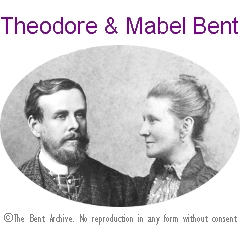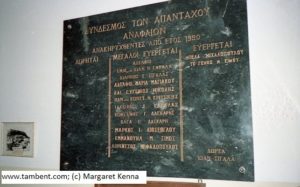
A superficially unremarkable photograph sent in recently by Anafi specialist Prof. Margaret Kenna contains a remarkable clue. The clue is a family name – Simos – on a plaque commemorating benefactors to the Association of Anafi Islanders (Greek Cyclades) in the early 1950s: a relatively prosperous family, thanks to one Matthaios Simos.
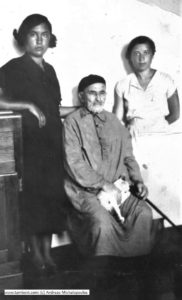
There is an archetype waiting for psychoanalysts to explore – the dragoman, the person you employ to facilitate your travel in foreign lands. Wiktionary helps here (if you want more, you are on your own): ‘From Middle English dragman, borrowed from Old French drugeman, from Medieval Latin dragumannus, from Byzantine Greek δραγομάνος (dragomános), from Arabic تُرْجُمَان (turjumān, “translator, interpreter”)’.
What type you get depends on your luck – from an Aristotle to a Zidane – and all travel narratives contain them, none more so than our great 19th-century accounts. And Theodore and Mabel Bent had an extraordinary one: not their first, Kostandinos Verviziotes (for the couple’s 1882/3 visit to Greece and Turkey), nor their second, George Phaedros from Smyrna, who started with the Bents as they left for the Cyclades in the winter of 1883. Theodore and Mabel engaged George on the recommendation of Mr Dennis at the Smyrna consulate. That he was only a moderate success may be inferred by Mabel’s initial lack of enthusiasm when he joins them again, at Ermoupolis, Syros, in December 1883. Apparently he enjoyed a drink, but he was also a grumbler and a terrible sailor – a distinct disadvantage when island-hopping, out of season, on small fishing boats. By Naxos, a few weeks later, the Bents had had enough of him, and one day, high up in a mountain village, they find themselves sitting in a warm room, and, “When Mr. Konstantinides our host came home he found 10 people drying their clothes, us two and Phaedros, Mr. Swan, and a man called Mantheos, a native of Anaphi who is to show Mr. Swan mines there…” George was dismissed on Naxos in January 1884 – with just five words in Mabel’s notebook: “We left Phaedros at Naxos”. The Bents went on, of course, to explore Anafi a few weeks later.
There is a sad letter (in English) from George folded into Mabel’s 1883/4 diary asking for remuneration, and although diversionary, no apologies are given for including it here, just skip it if you wish:
[C/O British Consulate Smyrna 1st February /84] Dear Mr Bent I am happy to learn from your favours of 20th January which I received on the 30th of the same, that both you and Mrs Bent are quite well. I have been always thinking of you how you managed with the continuation of your excursion, and how you got on with the unusual rough winter of this year exposing yourselves so, to the mercy and providence I dare say of God. As regards my passage to Smyrna after we departed, you will please learn that your hopes did not prove as expected for I did not escape of what I was fearing. The wretched steamer ‘Eptanisos’ which took you from Naxos on Monday the 7th of January 1884, did not come back to that island to pick me up for Syra until Wednesday the 9th January, (and about noon) and subsequently she kept going so slow, that I missed the Messageries steamer for Smyrna which was leaving Syra (bound for that town) on the same day. I have been waiting consequently six days in Syra and was obliged to spend almost all the money you gave me at Naxos, (viz: the 100 francs) that is to say in expenses for the Hotel in Syra, in changing my broken and shabby hat, and in paying for my passage or fare ticket to Smyrna which brought me home almost penniless. And my wife had already spent also, what I had sent her from Syra in buying some necessary things for the house, with the cause of the holidays etc. So my friends who expected me to return quite a rich man, contemplating, in their idea and opinion that I was getting £T5 [Turkish pounds] per day in consideration of the winter season travelling, were quite disappointed to find that I was obliged and in need to borrow money off them. Mr Dennis also told me that he did not think it was right for me to pay out of my pocket my passage to Syra and back and the expenses for the delay in waiting you in Syra etc., etc. As regards the salary I do not exactly appreciate the opinion of my friends, but I think it is fair that you should make a little allowance for the winter season, that is to say if you do not find it so inconvenient, so as to make it worth my while, as I am a fellow with a family as you know. I left Syra on the evening of Monday 14th January. I don’t know where you have spent that fearful evening and night but it was in my destiny to find myself in a most violent gale, but fortunately in a brave Arab steamer with Greek captains which was fighting with the elements of the nature that night and stand up like a giant against them. All the plates and glasses are broken and the water found its way in to the cabins. We overtook a steamer called ‘Simiotis’ and saw her bow deeped into the water and we thought she was going to be lost but we learnt that she turned back to Tinos. We kept up but we suffered until we faced the Bay of Smyrna. The impression of that night is still very brisk in my memory. But the necessity of a man is superior to the impression of fear. Although I foresee still bad weather going to be, I made up my mind to come and accompany you again and to be at Syra on the 16th February with the hopes that we shall ahoy the caïques and you will pay for my passage, etc. Please send through Mr. Binney some money for my travelling expenses, etc., enabling me thus to make my start. With my best regards to Mrs. Bent and Mr. Swan. I remain yours sincerely… George Phaedros.
This proved a letter in a bottle however and no reply to him is referenced. Within a few days of Phaedros’ abandonment, a whiskery Ariadne on Naxos, and Matthaios Simos (Mabel Bent spells him a multitude of ways over the next fifteen years, but ‘Manthaios’, awkwardly, seems to predominate) gets the top job as dragoman for the Bents, and begins a partnership – friendship really – with Theodore and Mabel that continues until 1897 and Theodore’s death. Missing only two or three seasons, Theodore (using the English telegraph station at Ermoupolis to reach him) wires Matthaios from London that he might be, on such and such a date, at Syros, or Rhodes, or Chios, or Alexandria, or Port Said, or wherever, to act as their translator, guide, cook, lodgings officer, victualler, foreman and general factotum. This small and wiry islander, who waited to marry until he had finished his career with the Bents, having by then sufficient resources, ‘plusios’ even, and a good catch. (As was the case with so many young Greeks who ventured far afield to escape difficult conditions back home.) Matthaios left his footprints in the sands of Southern Arabia, Sudan, Ethiopia, Egypt, Socotra, Yemen, as well as all around the Aegean.
It is fascinating to see in print and photographs how such a relationship developed. In his great book “The Cyclades”, this is Theodore in 1885: ‘My first experiences [of the islands] were made with the assistance of a dragoman; but, on better acquaintance with the language, I learnt to despise his services, and took as servant a native of one of the islands, who became invaluable in assisting me to discover points of folklore which without him it would have been impossible to arrive at.’
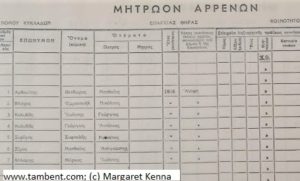
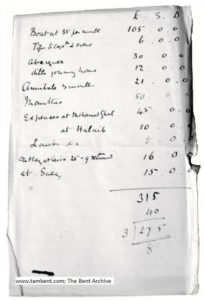
In the Community offices of Anafi, two hours’ ferry ride away and a little southeast of Santorini, the early registers of births (men only) record the arrival of Matthaios in 1846, son of a subsistence farmer, like nearly every other child. The chance that led him to Naxos and a meeting with the Bents in 1884, aged nearly forty, alters his life (there is a later reference by Theodore that he might have had a tobacco shop on the island as a younger man). In Mabel’s 1897 ‘Chronicle’, the year of her husband’s death, there is a list of travel costs payable, in Theodore’s hand. Matthaios’ wages for the trip to Socotra and Aden are £50, about £5000 today, and a huge sum for a Cycladic farmer at the turn of the 19th century; he is able to effectively retire to Anafi, marry, have a family (his descendants are now in Athens and no Simoses remain on the island), and tell of his adventures in foreign lands as dragoman and friend to an extraordinary English couple. He died in the mid-1930s, five years after Mabel’s death.
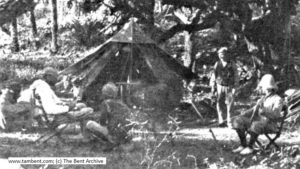
Mabel took his photograph on several occasions, the final one in Bent’s last camp, on Socotra in 1897: Theodore is on the left, taking down notes for his arcane dictionary of Socotran dialects. As well as their assistant Ammar, an unmistakable English figure in a topee, one Ernest Bennett, sits to the right. And between the two, just in the background, and alas not clear, stands a middle-aged man in his working clothes… this is Matthaios Simos. (There is also another splendid image of him sitting on a Sudanese camel; and we know too that, like a camel, he could exist on very little, as Mabel writes in her Tilos (the Dodecanese) journal in 1885: “… off [M] went bearing his coat, half a kid in one hand and a tied up bundle with his favourite scraps for his own eating. He is certainly cheap to feed. He eats all the fishes’ heads and yesterday lunched of cold lights.”)
For a glimpse of Anafi in the late 1970s, there is a wonderful video freely available we can recommend. The decades between 1884, and the Bents’ visit, and the making of the video, all seem to melt away, and much of what you see is how Theodore and Mabel would remember this extraordinary Cycladic isle.
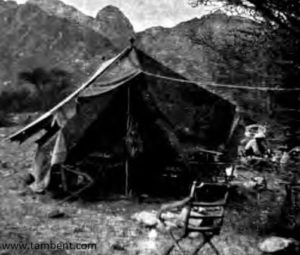
There was another serendipitous meeting for Matthaios Simos. The writer Vincent Scott O’Connor travelled in the Cyclades in the 1920s and found his way to Anafi. O’Connor had a copy of Bent’s book on the islands and jumped at the chance of an interview with Theodore’s famous (at least on Anafi) dragoman. He records him one evening, up in Chora, “The story-teller relaxed from his labours; a fine little old man with a curved nose and clean-cut features…” Manthaios tells of how he ‘saved’ the Bents from pirates on Samos in 1886: “At Samos,” he said, “there were pirates, who had made up their minds to kidnap the English travellers, and for that reason my master was unable to leave the island. It was I who circumnavigated their wiles… But it was not in these isles that we had our greatest adventures, it was in Arabia… Mrs. Bent was always eager to press on. One night we slept in a damp spot, and while there I had a dream in which I saw two horses and a chariot in Anaphe; but there was no driver, and one of the horses fell down and died. The chariot was overturned. My interpretation of the dream was that this portended a disaster to our party. But Bent only laughed at my fears. He said dreams were nothing but dreams. Nevertheless, as I expected, Mrs. Bent fell seriously ill of a fever which each day grew worse. She could ride no more, and the Arabs refused to carry a Christian, especially a woman. But the Sheikh put his shoulder to one end of the litter, as I did to the other; and so we carried her till the rest of them became ashamed and each took his turn. We arrived at the sea and the Sheikh sent out some milk for the lady, but she was so ill that she could not retain it and daily she became worse; yet she went on, saying that it was only a little fever, and she would not hear of our abandoning the journey… I decided then to act upon my own initiative, and a dhow having come into the harbour, I spoke to the Captain and contracted with him to take us to Aden. Then, for I knew how obstinate are these English, I went to Bent and said, ‘Kyrios, why not take ship to Aden?’ ‘Nonsense,’ he replied, ‘you know very well that there is no ship.’ ‘Maybe, Kyrios, but suppose that there were one, would you take it?’ ‘Well! Yes,’ he said, ‘I would, for she is very ill.’ I took him to the top of a hill and showed him the Dhow at anchor! So we started; but on arriving at Aden, there was a ‘quarantine’ and Madame was not allowed to land. The Governor however intervened in her favour and a doctor came at once to see her. He was only just in time, but her life was saved. It was after this that Bent himself began the illness that ended in his death… All were agreed that here was a great traveller, one like unto Odysseus himself.”
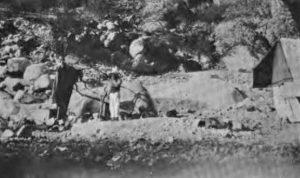
And the same, of course, must be said of the dragomános extraordinaire, Matthaios Simos, of Anafi in the Cyclades, and all points south-east!
(The excerpts above are mostly taken from ‘The Travel Chronicles of Mrs J. Theodore Bent‘, Vols. 1-3, published by Archaeopress, Oxford)
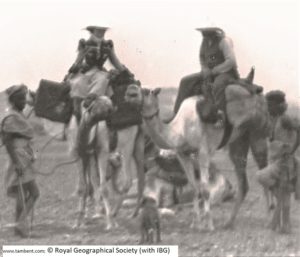
Some further notes on Matthew Simos and his family (June 2022)
We know only a little of the early story of Matthew Simos [Σίιμος Ματθαϊος], the Bents long-term ‘dragomanos’. The Anafi birth registers of the period record only males. Matthew is listed for 1846, the year before Mabel Hall-Dare first draws an Irish breath (1847), and six before Theodore Bent cries in Liverpool (1852). Matthew’s father is given as Anagnostis Simos [Σίιμος Αναγνώστης]; his grandfather was, probably, Jacobos. The Simos family appears not to be a long-established one on Anafi; conjecturally they arrived with Anagnostis from another Cycladic island (the Bents met Matthew on Naxos in the winter of 1883/4), the latter marrying an Anafiotissa. The term ‘sogambros’ might even be applicable to him.
Mabel records that Matthew had a brother on Anafi, and property, in which they stayed. This brother does not appear in the birth registers – was born on the island of his father? Mabel also mentions a niece of Matthew’s who had married into the Chalaris family. The Chalaris name is much represented today on Anafi, not so the Simos family. There is no reference by Mabel to Matthew’s parents, and perhaps they had both left us by the time the Bents made their brief visit to the island in 1884.
“We were three victims thus obliged to tarry [in Kavala, northern Greece], one moderately sentimental and soon sated with reminiscences of St Paul [i.e. Mabel Bent], one moderately fond of tobacco, and imbued with a feeling that there are other things to live for in this world beside smoke [i.e. Theodore Bent], and one, the servant to the other two [Matthew Simos], who keeps a tobacco shop in a far-off Greek island [Anafi in the Cyclades] ; he alone of the three was thoroughly happy at Cavalla during the enforced delay, and was busy all the time with his needle, padding his coat, waistcoat, and trousers with tobacco, with a view to deceiving the customs on his return home, and, when the time of our release eventually came, he presented the appearance of a fatted ox, and, as the weather was very hot, I tremble to think what his interior sensations must have been.” (J.T. Bent, 1889, ‘A Russian Monastery’. The Gentleman’s Magazine, Vol. 267, (Sep), 239-47 [quote is p.238].
Later in the Anafi birth registers we have the names of Matthew’s two boys – George, born in 1881, and Jacobus, born in 1886. We do not have his wife’s name, alas. In all the twenty years of so of Matthew’s work with the Bents in the Levant, Africa, and Arabia, the travellers make no reference to the wife and family of their loyal dragoman. Nor do we know the later family histories of George and Jacobos. Today the name Simos is no longer recognised on Anafi, and it seems that all the properties have gone; in one of Theodore’s essays he writes that Matthew had a tobacconist’s shop there. Matthew was still living on Anafi, however, in the late 1920s, and our photo shows him in old age (presumably he dies in the 1930s) with two of his grandchildren; his boys had presumably left for Athens by then, or abroad – tantalisingly, a George Simos, born 1886, in ‘Greece’, is listed in the US census data.
Matthew tells Vincent O’Connor (1929) of his times (and the ups and the downs) with the Bents, and shows him ‘two faded English photographs of Bent and his wife’ (if only we had them), and how that, when it comes to Theodore, ‘All were agreed that here was a great traveller, one like unto Odysseus himself.’ The same can be said of one Matthew Simos, of Anafi in the Cyclades.
